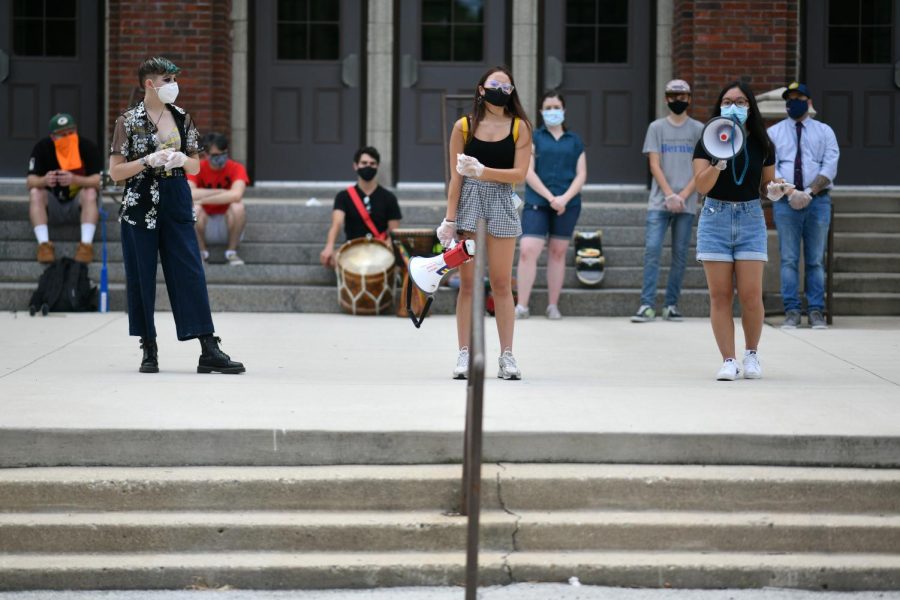Teen activism — Fighting For Our Future
Lane Tech students gathered outside the auditorium doors to protest against police officers working within CPS schools
“Why does it matter? It’s not like you can do anything about it anyway.”
These words have been said to me in a variety of different forms, all with the same intent. If you are a teenager with an interest in activism or politics, many are quick to jump to that statement.
For many, it is easy to write teenagers off in regards to their activism and interest in social issues, based on lack of experience. However, one shouldn’t be so quick to judge.
We are the future world leaders and lawmakers who will fight for continuous change. The current world leaders, however, are often those who criticize us the most. Many world-renowned activists are teenagers, who are often subject to this.
Names such as Greta Thunberg (18 year old climate activist, known for her school strike for climate justice) and Jamie Margolin (19 year old climate activist, most known for her work as a plaintiff suing the state of Washington for lack of accountability in regards to environmental racism) are not unusual to come up in conversation, or even in a classroom here at Lane.
With the ever growing increase in media accessibility, specifically in the realm of politics and social justice, the rise in teenage activism has skyrocketed. Teenagers across the United States have taken an interest in politics and activism, and Lane is no outlier in this.
One example of this is the Service Learning Project completed by Omega students every year. Last year, the Omega program’s English II class was tasked with finding a topic that resonated with them and conducting research to put out a public service announcement. This could then be shared on social media platforms to reach other students, increasing the reach and impact of the project itself.
For my project, I chose to focus on the Model Minority Myth faced by Asian Americans. As an Indian-American, whose father immigrated from India, I wanted to focus on a topic that I had some experience with. I created an Instagram post, spending hours perfecting the details. I found this project particularly gratifying, not only because I was able to learn new things, but because I was able to educate members of my community on this topic. Through research, as well as viewing people’s responses to the project itself, I got a sense of how much speaking out about topics that I believed in could have a positive impact (not only on the issue at hand, but on my outlook upon what I felt was within my capability as a student). I received an overwhelming amount of positivity and support, and that encouraged me to continue speaking out about things I believe in.
Sophomore Gianna Christensen, Div. 460, completed the same project last year and had an unexpected reaction to it as well.
“I just thought that [it] was really interesting. It was something that I never would’ve, researched on, or done, any kind of proactive thing,” Christensen said. “But, I’m really glad that I did it, and I’m looking forward to doing more [projects like this].”
The many protests such as #CopsOutCPS (Aug. 8, 2020) and Black Lives Matter (Oct. 13, & Jul. 11, 2020) held on our grounds are proof that Lane’s students fight for what they believe in. Many are encouraged to stand up for causes that affect them, such as students fighting for March For Our Lives. Allowing young people to participate in activism can inspire them to continue to establish their opinions and stimulate change throughout their lives — building confidence and public speaking skills.
Whether it’s the Climate Strike, Black Lives Matter rallies or women’s marches, you can always count on teenagers to show up and fight for their beliefs. Something that sets our generation apart from other generations of changemakers before us is social media, as it is a much newer concept, but also the central idea of allyship.
Allyship (defined as the practice of affirming social justice towards a marginalized/oppressed group), is crucial for change, as those with privilege in certain instances must utilize their privilege to amplify the voices of the unheard. Many are doing so for the sake of fighting for what they believe in, but others may be doing so in a performative manner. This is an additional justification for people not taking younger activists seriously. As teenagers, in order to be considered credible, we must prioritize productivity in contrast to performativity.
“I know so many people that …will post about stuff like on their Instagram stories. … But, they wouldn’t go to any protests, they wouldn’t sign any petitions, donate anything and I think they just do it to make themselves feel good, and not actually do it to help people,” Christensen said.
Activism on social media often prompts many to attend protests and participate in activism, not with the goal of creating change, but so they can look as though they do to their following. This occurs mostly when people are allies in their own way, as opposed to listening to the marginalized group they are fighting for and what specifically they can do to uplift them.
“I think there’s a lot of people, where it’s not performative and they genuinely care, but I think there is a good amount of people where, they don’t wanna put work or effort into it, and it’s just, so they can get that reassurance from other people,” said Penelope Ray, Div. 270.
Because of the highlight-reel that social media provides, it is more feasible for many to perform as though they care, or are doing so for the greater good, but are in actuality only doing so to appease others’ notions of them.
However, apart from the performative aspects, this is not to say that positive aspects of activism on social media are not present. While social media can provide an outlet for performative activism, it can also be a drive for immediate change and the spreading of awareness of issues to the global population. As always, the credibility and morality of teenagers is questioned, especially in regards to activism on social media.
She points at the idea that teenagers are constantly undermined and their ideas are pushed aside simply due to their age and lack of experience.
“I think that teenagers get a bad reputation sometimes, and get called like, stupid, or get represented like, we don’t know what we’re talking about,” Ray said. “We genuinely care about real life, important issues. And I don’t think we’re stupid, I think a lot of times, we do know what we’re talking about.”
Change and positive impact should be the intent of utmost importance when it comes to activism. However, that does not allow for the people to undermine the work of youth and adolescents specifically because of their age. As teenagers, it truly is up to us to determine the future, so long as we prioritize the effects of said activism and hear all voices.
Your donations directly fund the Lane Tech student journalism program—covering essential costs like website hosting and technology not supported by our school or district. Your generosity empowers our student reporters to investigate, write, and publish impactful stories that matter to our school community.
This website is more than a publishing platform—it's an archive, a research tool, and a source of truth. Every dollar helps us preserve and grow this resource so future students can learn from and build on the work being done today.
Thank you for supporting the next generation of journalists at Lane Tech College Prep!

Avaani is a senior, and this is her second year working with The Champion. While she enjoys covering news stories, her favorite stories to write are opinion...





